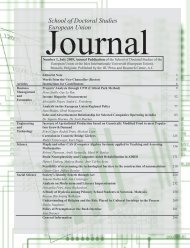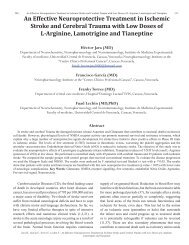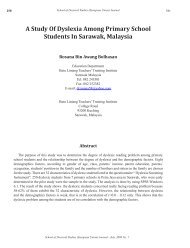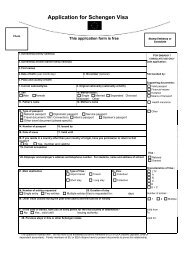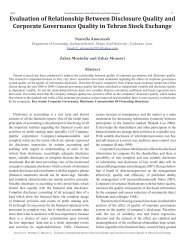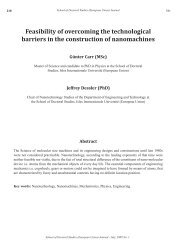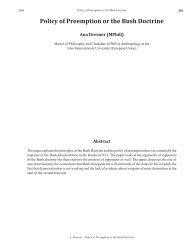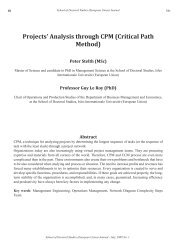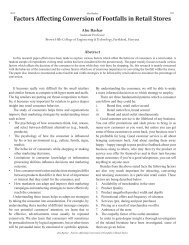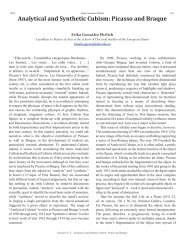Iiuedu.eu
Iiuedu.eu
Iiuedu.eu
Create successful ePaper yourself
Turn your PDF publications into a flip-book with our unique Google optimized e-Paper software.
40 School of Doctoral Studies (European Union) Journal2011cash into the economy has also been linked to this dramaticchange in ICT embracement. Muniruddeen, (2007) cited inAdesina & Ayo, (2010) corroborated this submissions thatthe banks’ huge investment in telecommunication networksand various e-Banking services delivery could be seen asan effort towards measuring up with global standard. Thisis among other reasons such as increased customer demand,increased competition among banks themselves; deriveminimized cost, new entrants, and better service delivery.Moreso, Schaechter (2002) argued that electronic bankinghas made it easier for customers to compare banks' servicesand products, increase competition among banks, andallows banks to penetrate new markets and thus expand theirgeographical reach. Some even see electronic banking asan opportunity for countries with underdeveloped financialsystems to leapfrog developmental stages. Customers insuch countries can access services more easily from banksabroad and through wireless communication systems,which are developing more rapidly than traditional "wired"communication networks. Prior to the introduction ofelectronic banking in Nigeria in the 1990’s mastermindedby the new generation banks such as Intercontinental Bank,Zenith Bank, Guarantee Trust Bank etc., financial servicesdelivery was very poor. Customers had to spend hour inlong qu<strong>eu</strong>es in the banking hall to carry out transactionseither to withdraw or deposit cash into their account. Thiswas the era of manual processing of transactions. The oldgeneration banks such as United Bank of Africa, First Bankof Nigeria and Union Bank of Nigeria saw themselves aslords in the financial service industry. They dictated thepace in the banking industry and being market leader withmany products and services, customers had no choice thanto patronize them. With the emergence of internet andelectronic banking, customers’ expectations in financialservices delivery are yet to be met, hence the reason for thispaper. This paper therefore is poised to look at the variousbenefits and challenges that were anticipated before theadvent of internet banking (that is, in those days when therewere long qu<strong>eu</strong>es and spending of hours in the banking hallto carry out transactions either to withdraw or to depositcash into your account) vis-a-vis the encountered benefitsand challenges after the advent of online banking. This wasas a result of the existing gap between actual and expectedfinancial services delivery to customers.The objective is to find out the correlation between thetwo pairs of the variables measured i.e. the anticipatedchallenges and benefits with encountered challenges andbenefits. But even with the development of e-commerce,online banking in developing countries has yet to receiveany significant attention among researchers, and so echoesthe general lack of information systems research in sub-Saharan Africa (Mbarika, Okoli, Byrd & Datta, 2004).Hence the reason for this research works. This paperis divided into five sections. Section one above is theintroduction, section two captured the literature review,section three looked at the methodology, while four andfive end the paper with discussion of findings, conclusionand recommendation.Literature ReviewThe concept of e-banking includes all types of bankingactivities performed through electronic networks. It is themost recent delivery channel of banking services which isused for both business-to-business (B2B) and businessto-customer(B2C) transactions (Mohammad, 2009).The definition of e-banking varies amongst researcherspartially because electronic banking refers to several typesof services through which a bank customer can requestinformation and carry out most retail banking services viacomputer, television or mobile phone (Daniel 1999; Molls1998; Sathye, 1999). Burr (1996) describes e-banking asan electronic connection between the bank and customer inorder to prepare, manage and control financial transactionswhile Leow, Hock Bee (1999) state that the terms PersonalComputer (PC) banking, online banking, Internet banking,telephone banking or mobile banking refers to a numberof ways in which customer can access their banks withouthaving to be physically present at the bank branch.Therefore, e-banking covers all these ways of bankingbusiness electronically (Mohammad, 2009). The discoveryof internet and what we called electronic commerce haveopened various opportunities for online trading all overthe world. It has brought the market close to the customersand potential customers at a relatively low cost. Infact,online purchase reduces cost compare to physical visitingof shop for purchase. This has opened the market of thedeveloped countries to the entire world. Also, financialinstitutions being the financial of the economy have beenthe champion of this crusade where their customers i.e.borrowers of fund cut across various countries. Adesina &Ayo, 2010 disclosed that the advent of Internet, electroniccommerce, communication technology and users’ responseto this technology has opened opportunity for manybusinesses including the financial institution. Before thisperiod, there were just a few dial-up e-mail providers inSchool of Doctoral Studies (European Union) Journal - 2011




